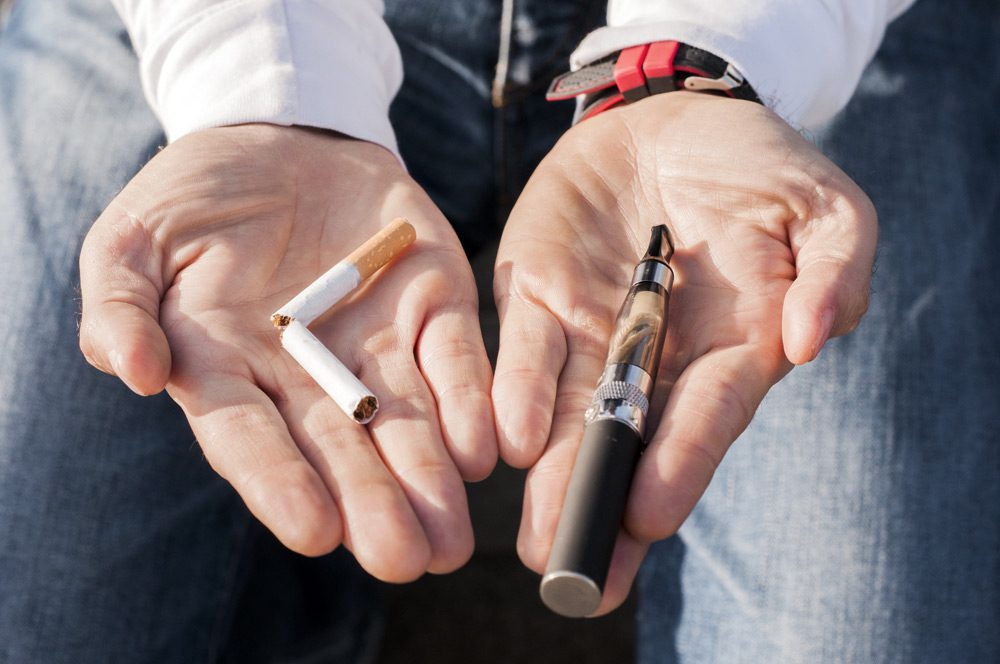The nicotine in both cigarettes and e-cigarettes plays a central role in making these habits so difficult to stop. As a stimulant and highly addictive substance, nicotine triggers your brain’s reward system, leading to short-term feelings of pleasure and relaxation, which reinforces the cycle of use—just like other substances. However, quitting smoking and vaping offers a wealth of emotional, mental, and physical benefits, including improved health, reduced anxiety and depression, and a greater sense of empowerment.
Why Smoking and Vaping Are Addictive
The U.S. Food and Drug Administration (FDA) states that nicotine is a psychoactive compound that prompts the release of dopamine in the brain, a neurotransmitter responsible for feelings of pleasure and reward. Over time, the brain becomes dependent on nicotine to maintain these pleasurable sensations. “Using any tobacco product can lead to nicotine addiction. This is because nicotine can change the way the brain works, causing cravings for more of it,” according to the FDA.
This creates a compulsive cycle similar to substance or alcohol misuse, where a person experiences cravings and withdrawal symptoms, leading them to continue the habit to relieve discomfort.
- Smoking. Traditional cigarette smoking delivers nicotine through the combustion of tobacco, which contains not only nicotine but also other harmful chemicals, including tar and carbon monoxide. The FDA reports that cigarettes “deliver more than 7,000 chemicals along with nicotine,” and cause severe damage to your respiratory system and other organs. Additionally, “nicotine, including nicotine salt, is listed by the Environmental Protection Agency as an acute hazardous waste.”
- Vaping. E-cigarettes and vaping devices work by heating a liquid containing nicotine, flavoring, and other chemicals. Though it lacks the tar and carbon monoxide of traditional cigarettes, vaping still delivers nicotine and causes similar harmful health effects as combustible products.
Another reason why smoking or vaping don’t help your recovery is that the habitual act becomes ingrained in your daily routine, creating behavioral triggers that reinforce compulsive use related to alcohol use disorder (AUD) and substance use disorder (SUD).
Additionally, while nicotine withdrawal isn’t quite as challenging for most people as alcohol and drug detox and withdrawal, many still experience irritability, anxiety, depression, and physical symptoms such as headaches and fatigue. Having proper support to quit makes all the difference.
Impact of Smoking or Vaping on Treatment and Recovery
These behaviors complicate your recovery journey by adding a layer of physical dependency that requires attention, reduces motivation, and may undermine the progress made in other areas. You might experience:
- An increased vulnerability to relapse. A 2021 study found that smokers in recovery were more likely to relapse. The stress of quitting nicotine while managing AUD or SUD can overwhelm individuals, leading to a return to old habits.
- Heightened emotional triggers. Nicotine provides temporary relief from stress and anxiety. When not addressed during recovery, some people may use it to cope with emotional discomfort, preventing them from developing healthier mechanisms crucial for long-term recovery.
- Complicated effort to reduce dependency. Smoking and vaping create a competing addiction that makes recovery from other substances more difficult. As noted above, nicotine often serves as a coping mechanism, and the rituals of smoking or vaping mimic addictive behaviors, reinforcing deeply ingrained habits.
- Physical and mental strain. Because nicotine negatively impacts physical health, including lung and cardiovascular function, this makes it harder for many people to fully engage in recovery efforts. The psychological toll of nicotine withdrawal—such as anxiety and mood swings—also complicates recovery from other substance use disorders.
Finding the Strength to Stop
Fortunately, quitting smoking or vaping as part of recovery improves treatment outcomes. Study findings published in Substance Use & Misuse found that individuals who quit smoking while in recovery from alcohol or drug addiction had a higher rate of long-term sobriety compared to those who continued smoking. The cessation of nicotine allows individuals to better focus on other aspects of their recovery, including therapy, support groups, and emotional healing.
But how can you quit successfully? Here are some terrific resources:
- SmokeFree.gov offers extensive information about coping with stress, managing cravings, using nicotine replacement therapy, and more.
- The American Cancer Society provides answers to common questions about stopping.
- The American Lung Association has a helpful step-by-step guide on how to quit.
- The Centers for Disease Control and Prevention shares tips from former smokers and other helpful tools.
- The FDA explains why quitting is so hard, how to work with a tobacco cessation counselor, and provides additional information.
How Great Oaks Can Help
The policy of our facility is not to deny someone’s entry into treatment because of the use of nicotine, but to address this as an addictive issue. As a premier addiction rehabilitation and dual diagnosis treatment center, Great Oaks Recovery Center, outside of Houston, Texas, our board-certified professionals have extensive counseling methods to help you address all aspects of compulsive behavior and work progressively toward better emotional, mental, and physical health. Reach out to our admissions team to learn more about our philosophy of care.



